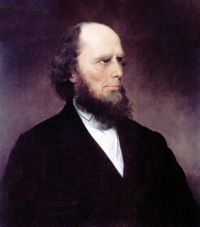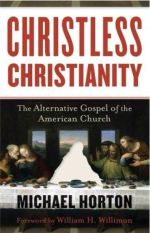Tag: michael horton Page 1 of 2
Osteen seems to be getting so much attention lately with his DC rally/revival, I see more and more friends posting quotes from him that are simply lies, so it’s time for another post detailing precisely where he goes wrong. And this is not unimportant.
Recently:
- What’s wrong with Joel Osteen? – Daily Caller
- Joel Osteen Worships Himself – Salon.com (Secular but still makes the same points as others. I don’t agree with the picture portrayed of the Puritans. Clearly the author has not read much o the Puritans and has a caricature in mind, from one sermon, i.e., Jonathan Edwards’ Sinners in the Hands of an Angry God)
- Now Joel Osteen Says Mormonism Itself is Christian – Apprising Ministries
Not so recently:
- Joel Osteen and the Glory Story – Michael Horton
- What Ever Happened to Sin? – Michael Horton
- Are You in God’s Story? – Michael Horton
- Suffering and a Theology of Glory – Michael Horton
- Doesn’t God Want Us to be Happy? – Michael Horton
- Become a Better You:Reflections on Joel Osteen’s Latest Book – Michael Horton
- The Gnosticizing Joel Osteen – Denny Burk
(Resources at the bottom of the page pertaining to this topic)
Over the past several years, the missional movement has picked up steam and has become a common modus operandi for ministry in mainstream evangelicalism, even within aspects of my own church. The term ‘missional’ has taken on many different definitions depending on the point of view. Tim Keller uses it one way, Dan Kimball, Dallas Willard and others [Doug Pagitt, McLaren] use it quite another.
[CORRECTION and update: apparently I’m wrong about Kimball and Keller having different views on missional-ism. Oddly enough, after just writing this, Keller and Kimball are on the same page it seems after releasing a joint manifesto along with some others such as Ed Stetzer and J.D. Greear: http://www.missionalmanifesto.net/ … so I retract that one part and added a couple of other names to show the contrast in views. In the manifesto, they make this statement: “It is first necessary to be clear about what missional does not mean. Missional is not synonymous with movements attempting to culturally contextualize Christianity, implement church growth, or engage in social action. The word missional can encompass all of the above, but it is not limited to any one of these.” And I’m glad they have said this. There is still the concern though about “mission creep” in this movement, that it can inadvertently become those things. I digress.]
Regardless, at the heart of the drive behind missional ecclesiology is a legitimate concern that the Western world at large needs to be re-evangelized, that believers need to go out as missionaries, as it were, and that we need to be reaching out more to the lost in both word and deed. I certainly share those concerns.
I keep seeing an ad on the right column of Facebook talking about the need “for a new conversation about the future of the church” … and my question is when did the existing “conversation” end, and better yet, why does it have to keep going on and on as if there is no definition laid out for us in Scripture?
In our gatherings on Sunday we need 1) Biblical worship that incorporates Scripture and solid doctrine, 2) Gospel-centered, exegetical preaching of the Word and sacrament (Michael Horton), which 3) the Holy Spirit uses to supernaturally transform His people more and more into the likeness of Christ, who 4) then take the Gospel out to the world through word and deed in their daily lives.

R. Scott Clark says of this video (at the bottom) on his blog, “Who Says the Evangelicals Don’t Have a Liturgy?” As much as we Evangelicals have tried to eschew the “traditional” styles of church, it seems we’ve merely replaced it with newer styles that are 3 inches deep. This is one of many reasons why so many are leaving these kinds of churches for 1) nothing, 2) the Roman Catholic church, or 3) other traditional-style Protestant churches (Reformed and otherwise) that don’t take the worship service so casually, as if they weren’t approaching the throne of God.
I believe there needs to be reverential awe when we come together before God’s throne corporately (and privately), knowing Him to be the very God Isaiah, Ezekiel, Job and John (Revelation 1) approached, and at the same time, the gentle Shepherd who saves His people mercifully through the cross and resurrection. “The fear of the Lord is the beginning of wisdom.” (Proverbs 1:7) In many of these churches, you don’t get the feeling the people are in awe of God, just emotionally jazzed up, the same way you are at a concert of your choosing.

- The Disturbing Legacy of Charles Finney – Dr. Michael Horton
- A Wolf in Sheep’s Clothing – Phil Johnson
I still have yet to understand why so many leading evangelical pastors (Billy Graham and the late Jerry Falwell to name two) and others in the movement uphold this man as someone who championed the faith once for all delivered to the saints. If there is one person that can be blamed for so many of the current theological and ecclesiological problems we find in the evangelical movement (though there are many causes to be sure), it is Charles Finney. These articles deal with the content of what Finney taught and how it was anything but evangelical, in the historical, Gospel sense of the word.
After reading these, you will see a little bit clearer how much of his influence is still felt in the church today and how much damage it continues to cause. Even much of the pragmatic, mega, seeker movement in the church owes its pragmatic thought process about how to “get people in the door” to the teaching of Finney, which he himself rooted in the error of Pelgius, the fifth century heretic. Very insightful.
 Here we are in the North American church—conservative or liberal, evangelical or mainline, Protestant or Catholic, emergent or otherwise—cranking along just fine, thank you. So we’re busy downsizing, becoming culturally relevant, reaching out, drawing in, making disciples, managing the machinery, utilizing biblical principles, celebrating recovery, user-friendly, techno savvy, finding the purposeful life, practicing peace with justice, utilizing spiritual disciplines, growing in self-esteem, reinventing ourselves as effective ecclesiastical entrepreneurs, and, in general, feeling ever so much better about our achievements.
Here we are in the North American church—conservative or liberal, evangelical or mainline, Protestant or Catholic, emergent or otherwise—cranking along just fine, thank you. So we’re busy downsizing, becoming culturally relevant, reaching out, drawing in, making disciples, managing the machinery, utilizing biblical principles, celebrating recovery, user-friendly, techno savvy, finding the purposeful life, practicing peace with justice, utilizing spiritual disciplines, growing in self-esteem, reinventing ourselves as effective ecclesiastical entrepreneurs, and, in general, feeling ever so much better about our achievements.
Notice anything missing in this pretty picture? Jesus Christ!

